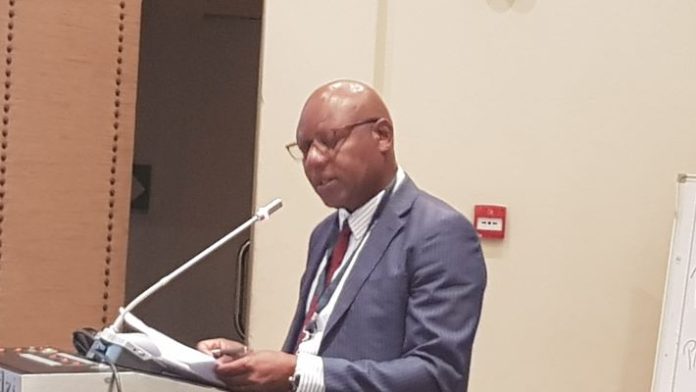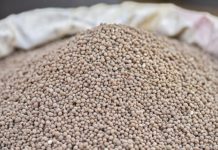AFRICA should invest in quantity, quality and heightened dissemination of agricultural rural information for sustained food security and endeavour to insulate the continent from among other headwinds, food versus. Bio-fuels, global warming, environment, gender, and food security, COVID 19, the African Development Bank says.
Despite the continent’s potential to remain sustainable and food secure and further improve the rural economy, the lack of reliable data and capacity to disseminate to various end-users has dwarfed the continent’s growth despite the various available initiatives AfDB and other players have initiated over the years.
The emerging of new data requirements to inform policy on the emerging development has worsened the situation.
Officiating at the five-day African Development Bank (AfDB) organized physical regional compilation and validation workshop on the agricultural minimum set of core data for African Development Fund (ADF) 37-member Countries-Bank’s country economist and officer in Charge of the AfDB Country Manager in Lusaka-Agola Oluoch noted the lack of such necessitation.
These have tended to threaten growth of agriculture and the rural economy, being the backbone of most of the countries’ economies, contributing at least 40% to GDP, over 75% to total exports and above 80% of employment for most African countries.
Agriculture and rural sectors remain cardinal to the national economy, making the sector the key to general improved economic performance, increased incomes and raising of standards of living of households as well as poverty eradication in most of our countries hence the need to ensure reliable statistical data for policy formulation and economic development.
The failure to disseminate agriculture and rural economy information amid various headwinds prompted the AfDB since 2015 to initiate various strategies including the current Phase V of the Statistical Capacity Building program for (SCB-V), being executed by COMESA using AfDB Grant to develop for maintaining the momentum built on past gains whilst shielding against possible reversal of the gains made across the continent in recent years.
The SCB-V seeks to among other components; improving the availability and quality of economic statistics, including the measurement of the COVID-19 impact, Improving the quality and availability of Social Statistics and reporting on COVID-19, Data Collection, Management and Dissemination and Strategic Planning, Systems Development, Coordination, and Training.
The initiative envisaged that under SCB-V, all African countries would establish a Minimum Set of Core agricultural Data (MSCD) and accelerate information dissemination on a regular basis and provide national and international policy makers necessary information that goes across national boundaries.
“This will serve as the beginning point for improvement of agricultural and rural statistics since the total amount of data that would be required to meet all requirements exceeds what most developing countries can currently provide until the capacity of their statistical systems has been substantially increased. “ said Mr. Oluoch.
The AfDB’s Statistics Department is maximizing the available WFH to significantly improve various instruments to accelerate the availability of data for all its member states to contribute to the production quality data.
This is espoused under the African Transformation Agenda (ATA) and accelerates its desire to attain its initiative under the “feed Africa Initiative”.
Under ATA, the Bank’s MSCD covers crop production, core agricultural inputs, land cover and use, livestock production, aquaculture and fisheries, forestry production, food consumption, trade data, consumer and producer food prices-based on accurate and available data which has lack in recent years heightened by the COVID 19 pandemic, climate change and other factors.
AfDB had since August 2017, published MSCD for 47 countries (87%) on the Africa Information Highway, a data portal of the Bank. In November 2018, an updated version of data was published for 50 countries (93%).
In May 2019 an updated version of data was published for 52 countries (96%).
In 2020, given that national statistical systems in Africa were negatively impacted by the outbreak of the COVID-19, the financial institution was unable to organize a Regional Compilation and Validation Workshop for the 2019 MSCD cycle instead held it virtually in December 2020 to avert spread of the pandemic.
The onset of the plague forced only a total of 22 countries (41%) reporting on their updated MSCD.
Under phase 5-member states will be required to up their data collection and close the gaps, improve the availability and quality economic data and measure the impacts created by COVID 19 on economies.
The programme will enhance the improvement of the quality and availability of social statistics and reporting the pandemic while strategically planning, systems development coordination and training as well as ensuring data collection management and dissemination.
Zambia Statistical Agency (ZAMSATS) Mulenga Musepa noted COVID 19 and the poor funding to National Statistical Systems generally which have weakened national capacities to generate data.
He urged African Governments to invest in statistics for the agriculture sector to become buoyant and contribute effectively to food security and avert hunger and poverty on the continent driven by various local and geo-political factors.
“It is a well-known fact that the NSS in Africa are weak and poorly funded, this makes it difficult for regional member countries to undertake statistical operations in line with the international best practices for optimal evidence based policy dialogue.” He said.
The onset of the pandemic, affected budgets for many countries and diverted resources to fight the pandemic and save lives, thus creating several gaps hence the need to revisit and invest in cost effective data collection methods and the use of improved ICT solutions.
At the same occasion, Common Market for Eastern and Southern Africa deputy secretary general Kipyego Cheluget commended the introduction of the SCB V-a compilation of updated minimum set of data for last year.
This is to ensure the realization of the realignment of the agriculture development in terms of economic development and enhanced living standards, fighting poverty and increasing food security, all forming part of the Sustainable Development Goals (SDGs), all vital to the development of the sector.
He reaffirmed the Regional Economic Bloc’s commitment to the realization of a viable agricultural sector and improving rural economies as evidenced by its Council of Ministers approving the 2021-2025 Medium Term Strategic Plan.
The strategy which hinges on among other pillars, relies on enhancing productive integration, recognizes the importance of the productive sector in enhancing regional integration-given the significance of the sector in the named pillar.
“Within this sector our strategy focuses on catalyzing inclusive agriculture growth and sustainable transformation, agriculture growth and sustainable Sanitary and Phytosanitary and Sanitary (SPS) and the blue national economy (fisheries),”









